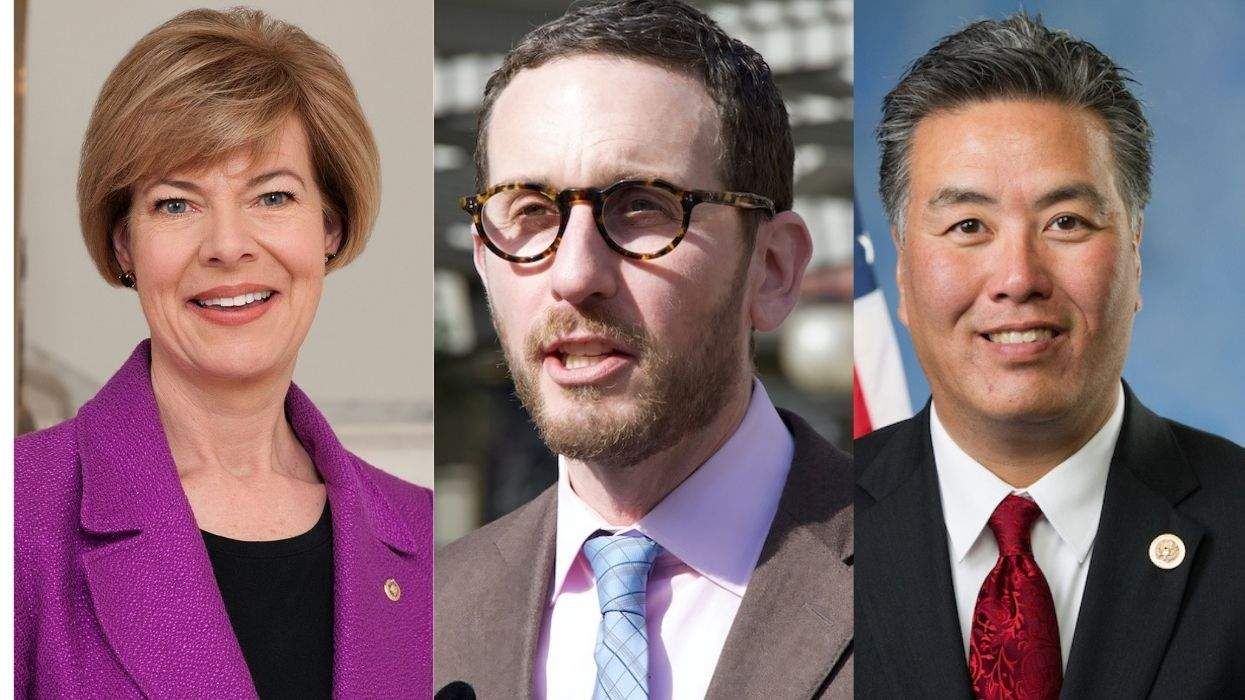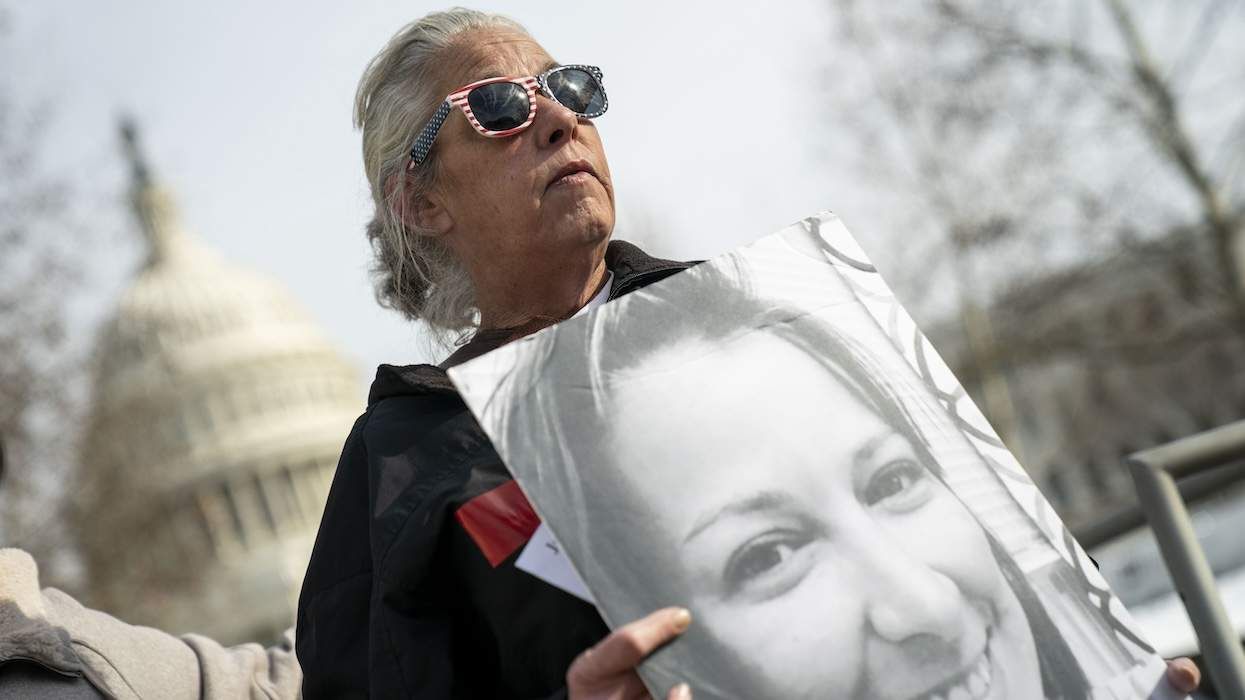February 06 2006 4:55 PM EST
CONTACTAbout UsCAREER OPPORTUNITIESADVERTISE WITH USPRIVACY POLICYPRIVACY PREFERENCESTERMS OF USELEGAL NOTICE
© 2026 Equal Entertainment LLC.
All Rights reserved
All Rights reserved
By continuing to use our site, you agree to our Privacy Policy and Terms of Use.
We need your help
Your support makes The Advocate's original LGBTQ+ reporting possible. Become a member today to help us continue this work.
Your support makes The Advocate's original LGBTQ+ reporting possible. Become a member today to help us continue this work.
Betty Friedan, whose manifesto The Feminine Mystique helped shatter the cozy suburban ideal of the post-World War II era and laid the groundwork for the modern feminist movement, died Saturday, her birthday. She was 85. Friedan died at her Washington, D.C., home of congestive heart failure, according to a cousin, Emily Bazelon. Few books have so profoundly changed so many lives as did Friedan's 1963 best seller. Her assertion that a woman needed more than a husband and children was a radical break from the Eisenhower era, when the very idea of a wife doing any work outside the home was fodder for gag writers, like an episode out of I Love Lucy. Independence for women was no joke, Friedan wrote. The feminine mystique was a phony deal sold to women that left them unfulfilled, suffering from "the problem that has no name," and seeking a solution in tranquilizers and psychoanalysis. "A woman has got to be able to say, and not feel guilty, 'Who am I, and what do I want out of life?' She mustn't feel selfish and neurotic if she wants goals of her own, outside of husband and children," Friedan said. Sen. Hillary Rodham Clinton said Friedan's activism and writing "opened doors and minds, breaking down barriers for women and enlarging opportunities for women and men for generations to come. We are all the beneficiaries of her vision." Eleanor Smeal, president of the Feminist Majority Foundation, publisher of Ms. magazine, and a former president of the National Organization for Women, praised Friedan's legacy. Friedan, she said, "was a giant for women's rights and a leading catalyst of the 20th century whose work led to profound changes improving the status of women and women's lives" worldwide. The Feminine Mystique helped to "define the lesser status of women," she said. In the racial, political, and sexual conflicts of the 1960s and '70s, Friedan's was one of the most commanding voices and recognizable presences in the women's movement--stocky and big-eyed, with a personality to match, clashing even with Gloria Steinem and other feminists. As the first president of NOW in 1966, Friedan staked out positions that seemed extreme at the time on such issues as abortion, sex-neutral help-wanted ads, equal pay, promotion opportunities, and maternity leave. Friedan, deeply opposed to "equating feminism with lesbianism," conceded later that she had been "very square" and uncomfortable about homosexuality. "I wrote a whole book objecting to the definition of women only in sexual relation to men. I would not exchange that for a definition of women only in sexual relation to women," she said. Nonetheless she was a seconder for a resolution on protecting lesbian rights at the National Women's Conference in Houston in 1977. "For a great many women, choosing motherhood makes motherhood itself a liberating choice," she told an interviewer two decades later. But she added that this should not be a reason for conflict with "other feminists who are maybe more austere, or choose to seek their partners among other women." By then in her 70s, Friedan had moved on to the issue of how society views and treats its elderly. She said that while researching her last book, The Fountain of Age, published in 1993, she found those who dealt with old people "talk about the aged with the same patronizing, 'compassionate' denial of their personhood that was heard when the experts talked about women 20 years ago." Friedan, born February 4, 1921, in Peoria, Ill., was a high-achieving Jewish outsider growing up in Middle America. Her father, Harry Goldstein, owned a jewelry store; her mother, Miriam, quit a job as a newspaper women's page editor to become a housewife. As a girl, Friedan watched her mother "cut down my father because she had no place to channel her terrific energies, a typical female disorder that I call impotent rage," she said. From high school valedictorian in 1938 to summa cum laude graduate of Smith College in 1942, "I was that girl with all A's, and I wanted boys worse than anything," she said. She won a fellowship in psychology to the University of California, Berkeley, but turned down a bigger fellowship there so as not to outdo a boyfriend. The romance broke up anyway, and Friedan moved to Greenwich Village in New York and became a labor reporter. She lost one job to a returning World War II veteran but found another before marrying Carl Friedan, a summer-stock producer and later an advertising executive, in 1947. The marriage, which produced three children, ended in divorce 22 years later. Friedan got a maternity leave to have her first child in 1949 but was fired and replaced by a man when she asked for another leave to have the second child five years later. The family had moved to a big Victorian house in the suburban Rockland County village of Grandview-on-the-Hudson, N.Y., where Friedan cranked out freelance magazine articles while bringing up her brood. Hoping to get a magazine piece out of a Smith College 15-year reunion, Friedan prepared an in-depth survey of her classmates. What she found was that these well-educated women of the class of 1942, now largely suburban housewives, were asking, in effect, "Is this all?" Friedan couldn't get the article published in a magazine, but five more years of research and writing turned it into The Feminine Mystique. If some women read it as a call to arms, others were outraged, Friedan recalled. Dinner invitations stopped; she was out of the school car pool. But the first printing of 3,000 eventually grew to 600,000 copies hardcover and more than 2 million in paperback. The book was listed at number 37 on a 1999 New York University survey of 100 examples of the best journalism of the century. In 1964, the family moved back to Manhattan, and Friedan began working to have the federal government enforce the Civil Rights Act as it applied to sex and not only to race, religion, and national origin. Founding NOW was a response to federal inaction. The finale of Friedan's presidency was the national women's strike of August 1970, which brought women out across the country on the 50th anniversary of women's suffrage. She also was a founder in 1968 of the National Conference for Repeal of Abortion Laws, which became the National Abortion Rights Action League, and of the National Women's Political Caucus in 1971. During the following decade she taught and lectured, and her 1981 book, The Second Stage, was seen by many as a public break with the feminist leadership that had succeeded her. She said they had pursued "sexual politics that distorted the sense of priorities of the women's movement during the 1970s" and had opened the way for conservatives and reactionaries to occupy the center on family issues. In The Second Stage, Friedan also appeared to accept criticism from some women that The Feminine Mystique was too dismissive of domestic life. "Our failure was our blind spot about the family," she wrote. Susan Faludi, author of the best-selling Backlash, would accuse Friedan of "yanking out the stitches in her own handiwork." (AP)
From our Sponsors
Most Popular
Bizarre Epstein files reference to Trump, Putin, and oral sex with ‘Bubba’ draws scrutiny in Congress
November 14 2025 4:08 PM
True
Jeffrey Epstein’s brother says the ‘Bubba’ mentioned in Trump oral sex email is not Bill Clinton
November 16 2025 9:15 AM
True
Watch Now: Pride Today
Latest Stories
Is there a link between autism and being transgender? Here's what the science says
January 02 2026 9:00 AM
The films of bisexual actor Anthony Perkins: Beyond Psycho's Norman Bates
January 02 2026 7:00 AM
All about the Mattachine Society, the first enduring U.S. gay rights group
January 01 2026 8:00 AM
Canceled shows and record lows: How Trump is killing the Kennedy Center
January 01 2026 7:00 AM
As groundbreaking trans politician Andrea Jenkins retires, a look at her life and career
December 31 2025 5:49 PM
9 queer celebrities who made us proud in 2025
December 31 2025 4:35 PM
9 viral queer moments of 2025: From Nicki's right turn, to the 'Funeral Stud'
December 31 2025 4:30 PM
Kellyanne Conway says Trump critics need a husband — including lesbian Rosie O'Donnell
December 31 2025 2:54 PM
San Francisco green-lights affordable housing for LGBTQ+ seniors
December 31 2025 11:45 AM
If 2025 tested our resolve, 2026 will prove our resilience
December 31 2025 7:00 AM
Kazakhstan bans so-called LGBTQ+ propaganda
December 30 2025 3:24 PM
Trump administration bans abortions through Department of Veterans Affairs
December 30 2025 11:07 AM
Zohran Mamdani: Save a horse, play a yet-unreleased Kim Petras album
December 30 2025 10:29 AM
Trending stories
Recommended Stories for You




































































Charlie Kirk DID say stoning gay people was the 'perfect law' — and these other heinous quotes